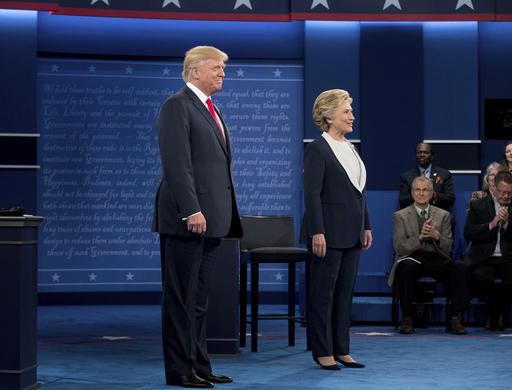
By Vittoria Elliott and Jennie Kamin
This week, the presidential candidates headed into the second debate with an unprecedented flood of scandal on their heels that may change the course of the conversation for the rest of the campaign. They were this year’s “October Surprise,” and the month is less than half over.
First, The Washington Post released a video of Donald Trump that captured a hot mic in which Trump described his methods of picking up women and an attempt to sleep with a married woman, a conversation widely criticized as bragging about what amounts to sexual assault. This story broke exactly a week after The New York Times published a copy of Trump’s 1995 tax returns, the whole of which have not been released—but which detailed shocking business losses that it appears he used to avoid taxes for years
Meanwhile, although it didn’t rise high during a Trump-fueled news cycle, Buzzfeed published transcripts of Clinton’s speeches to Wall Street banks, excerpts of which had been emailed by her opposition research team and found their way onto Wikileaks, after Clinton’s email was hacked this summer. In the speeches, Clinton appears to downplay the role that big banks played in creating the 2008 financial crisis, saying the situation was “more complex.”
While the first presidential debate, on September 26, covered sensitive issues—around racial tensions and policing, international trade, and taxation, among others topics, it’s almost certain that the conversation will now shift significantly towards Clinton’s bank ties and, most certainly, Trump’s regard for women.
“This debate will be interesting because the audience asks the questions,” Craig LaMay, Associate Dean of Journalism at Northwestern, said before the debate began. “The candidates won’t be talking to each other.”
Still, “debates don’t necessarily shape public opinion. It’s not football. Each side thinks that their guy won,” LaMay said. “What they do is energize the base, they get people to turn out to vote.” Yet the debates have the power to set the agenda for both candidates in the following weeks. “The points in the debate become the talking points on the campaign trail.”
Pre-election scandals are nothing new, and candidates face increasing scrutiny in the weeks leading up to an election. In fact, the phenomenon is so common that there is even a name for it—”October Surprise.” And they can shift the playing field in unforeseen ways.
The term was coined in 1972 amid the contentious race between President Richard Nixon and Democratic challenger, George McGovern. Nearly two weeks before the election, the National Security Adviser, Henry Kissinger, suggested at a press conference that the administration would end the unpopular war in Vietnam, though no specific plan was given (and, as it turned out, Kissinger was grossly exaggerating). Nixon was already favored to win the election and, though he knew Kissinger was wrong, backed his story while stumping on the campaign trail. In any event, U.S. troops remained in Vietnam for another three years.
Another example: In 1980, President Jimmy Carter’s campaign suffered a major blow when, just two days before the election, after what seemed to be promising negotiations, it became clear that the 52 US citizens held hostage in Tehran would not be released. At the time, the polls were too close to call, but many experts agree that Carter’s failure to bring home the hostages made him look weak, perhaps sealing his defeat. Reagan won the election and the hostages were released the same day.
Now what? With reporters from The Washington Post and beyond looking for other conversations involving Donald Trump, with Wikileaks vowing to reveal secrets about Clinton, and with Russian hackers in the mix, LaMay offers a “wacky prediction” of his own. “I think a number of states, including North Carolina, will have disputed vote counts,” he predicted, throwing the presidential decision to the Supreme Court “Which will go four to four,” LaMay said. “That’s when I’m moving to Mexico.”


Leave a Reply